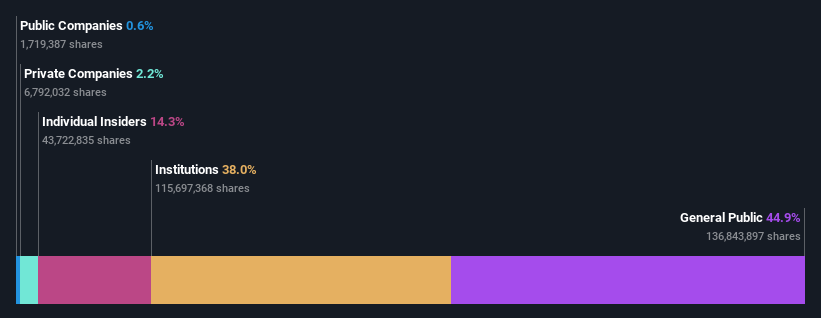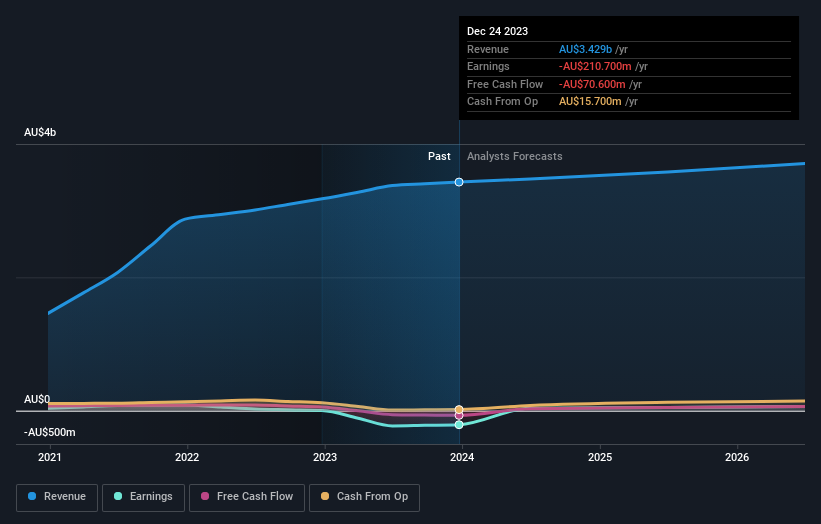While institutions invested in Bega Cheese Limited (ASX:BGA) benefited from last week's 6.5% gain, individual investors stood to gain the most
Key Insights
Bega Cheese's significant individual investors ownership suggests that the key decisions are influenced by shareholders from the larger public
The top 17 shareholders own 50% of the company
A look at the shareholders of Bega Cheese Limited (ASX:BGA) can tell us which group is most powerful. And the group that holds the biggest piece of the pie are individual investors with 45% ownership. Put another way, the group faces the maximum upside potential (or downside risk).
While individual investors were the group that benefitted the most from last week’s AU$82m market cap gain, institutions too had a 38% share in those profits.
Let's take a closer look to see what the different types of shareholders can tell us about Bega Cheese.
View our latest analysis for Bega Cheese
What Does The Institutional Ownership Tell Us About Bega Cheese?
Institutional investors commonly compare their own returns to the returns of a commonly followed index. So they generally do consider buying larger companies that are included in the relevant benchmark index.
We can see that Bega Cheese does have institutional investors; and they hold a good portion of the company's stock. This suggests some credibility amongst professional investors. But we can't rely on that fact alone since institutions make bad investments sometimes, just like everyone does. When multiple institutions own a stock, there's always a risk that they are in a 'crowded trade'. When such a trade goes wrong, multiple parties may compete to sell stock fast. This risk is higher in a company without a history of growth. You can see Bega Cheese's historic earnings and revenue below, but keep in mind there's always more to the story.
We note that hedge funds don't have a meaningful investment in Bega Cheese. John Forrest is currently the largest shareholder, with 11% of shares outstanding. For context, the second largest shareholder holds about 6.2% of the shares outstanding, followed by an ownership of 5.0% by the third-largest shareholder.
A closer look at our ownership figures suggests that the top 17 shareholders have a combined ownership of 50% implying that no single shareholder has a majority.
While studying institutional ownership for a company can add value to your research, it is also a good practice to research analyst recommendations to get a deeper understand of a stock's expected performance. Quite a few analysts cover the stock, so you could look into forecast growth quite easily.
Insider Ownership Of Bega Cheese
The definition of company insiders can be subjective and does vary between jurisdictions. Our data reflects individual insiders, capturing board members at the very least. Company management run the business, but the CEO will answer to the board, even if he or she is a member of it.
Insider ownership is positive when it signals leadership are thinking like the true owners of the company. However, high insider ownership can also give immense power to a small group within the company. This can be negative in some circumstances.
Our information suggests that insiders maintain a significant holding in Bega Cheese Limited. Insiders own AU$193m worth of shares in the AU$1.3b company. It is great to see insiders so invested in the business. It might be worth checking if those insiders have been buying recently.
General Public Ownership
The general public-- including retail investors -- own 45% stake in the company, and hence can't easily be ignored. While this group can't necessarily call the shots, it can certainly have a real influence on how the company is run.
Next Steps:
It's always worth thinking about the different groups who own shares in a company. But to understand Bega Cheese better, we need to consider many other factors. Be aware that Bega Cheese is showing 1 warning sign in our investment analysis , you should know about...
If you would prefer discover what analysts are predicting in terms of future growth, do not miss this free report on analyst forecasts.
NB: Figures in this article are calculated using data from the last twelve months, which refer to the 12-month period ending on the last date of the month the financial statement is dated. This may not be consistent with full year annual report figures.
Have feedback on this article? Concerned about the content? Get in touch with us directly. Alternatively, email editorial-team (at) simplywallst.com.
This article by Simply Wall St is general in nature. We provide commentary based on historical data and analyst forecasts only using an unbiased methodology and our articles are not intended to be financial advice. It does not constitute a recommendation to buy or sell any stock, and does not take account of your objectives, or your financial situation. We aim to bring you long-term focused analysis driven by fundamental data. Note that our analysis may not factor in the latest price-sensitive company announcements or qualitative material. Simply Wall St has no position in any stocks mentioned.


